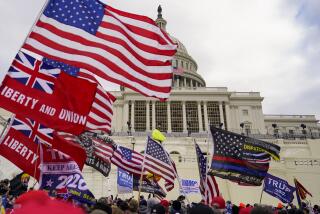DNC Got Top-Secret Intelligence on Donor, Sources Say
- Share via
WASHINGTON — The White House supplied top-secret intelligence information to the Democratic National Committee to block a Latvian businessman with alleged ties to organized crime from attending a $25,000-a-person fund-raising dinner with President Clinton, according to government officials and other sources.
The effort was successful, and the committee abruptly revoked the invitation of the businessman, Grigori Loutchansky, who had been formally invited to attend the DNC fund-raising dinner in 1995.
In the course of the episode, political operatives in the White House and the DNC gained access to and disseminated information gathered by some of the nation’s most sensitive intelligence-gathering methods. Many did not have the required high-security clearances to receive such information.
Officials involved in the incident said that while checking Loutchansky’s background, the White House National Security Council reported to the political affairs office there that the National Security Agency was monitoring his international telephone calls.
Loutchansky’s firm, Nordex, allegedly was associated with Russian organized crime organizations, officials said. The political affairs office, in turn, reported to the DNC about the monitoring program, officials said.
“This was top secret, and it further demonstrates the total politicization of all intelligence and White House operations,” said one senior official. “Anything and everything was done in the name of fund-raising.”
The administration has been embarrassed repeatedly by reports that a number of felons, drug dealers and others with unsavory backgrounds attended White House coffees and DNC fund-raisers with the president, who has acknowledged that screening procedures were too lax.
The latest disclosure has left Democratic Party sources wondering whether future efforts to run a full check on a fund-raising dinner guest might backfire. “You really are damned if you do and damned if you don’t,” one source said.
A Latvian who now lives in Israel, Loutchansky is a controversial figure who has been barred from entering the United States, Canada and Britain. His attorney, Thomas Spencer Jr., disputed the reports of his client’s alleged ties to organized crime.
“It’s an outrageous, false allegation,” Spencer said Monday.
The Loutchansky telephone intercepts were considered “sensitive compartmented information,” which meant the intelligence was to be distributed only to named individuals with the highest government security clearances.
The Loutchansky incident began when the DNC, concerned about a foreign national attending a presidential dinner, asked the White House to check on the Latvian.
According to one source, the NSA monitored conversations between Loutchansky and Sam Domb, a New York real estate executive and DNC donor who was planning to contribute $25,000 so that Loutchansky could attend a July 20, 1995, dinner with Clinton at the Mayflower Hotel.
A senior government official Monday confirmed the NSA monitoring of Loutchansky in 1995, but maintained that although the NSA had an extensive file of intercepted international Loutchansky phone calls, it contains none between Loutchansky and Domb, an American citizen.
Another source insisted that specific information about a Loutchansky phone call with Domb was passed to the DNC.
After receiving the oral report on Loutchansky’s alleged connections, a DNC official called Domb, who rescinded the dinner invitation to Loutchansky.
Domb told the DNC he did not know of Loutchansky’s alleged connections with organized crime. Domb was “trying to do business with him and trying to impress him” by sponsoring Loutchansky at the presidential dinner, a DNC official said. Domb did not return repeated calls.
More to Read
Get the L.A. Times Politics newsletter
Deeply reported insights into legislation, politics and policy from Sacramento, Washington and beyond. In your inbox twice per week.
You may occasionally receive promotional content from the Los Angeles Times.










